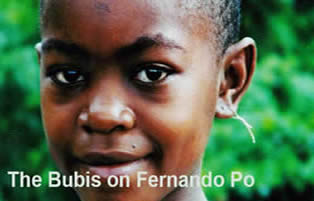
Bubi chief in traditional costume. (Photo from Los Bubis on Fernando Poo)
Introduction
That the indigenous people of Fernando Poo Island belong to the large Bantu family is fundamental knowledge for anyone hoping to become even moderately educated in African ethnography and ethnology.
In the opinion of celebrated Africanist Delafoss (1) and others, the original Bantu were from numerous villages situated south of an irregular demarcation line that divides Rodolfo Lake, ends in the mouth of the King River in the Atlantic, runs from here to the Cape of Good Hope, and only among them exist ethnic and linguistic ties.
The Bantu never formed vast states or huge empires in the manner of the strong Sudanese family. Not that the Bantus were in any way inferior to the other African races, from the social and political points of view, nor in them was there less passion for profit, ambition, power, and authority – traits that produced conquerors and founders of expanding empires. It is simply that their country is covered in large part by dense and impenetrable jungles and crossed by innumerable waterways. Annual floods present insurmountable obstacles and, therefore, make the area less favorable for military enterprises, political relations, and trade.
Bantu origin is much obscured, and at the present it is a little less than impossible to mark for certain their ancient region. Nonetheless, the majority of anthropologists who have thoroughly studied the subject agree that the Bantu cradle was an immense territory of lakes between the source of the Nile, Congo, and Ubangi rivers.
Africanists disagree in which era the dispersion of different Bantu groups took place. Some are of the opinion that it was around the fifteenth and sixteenth centuries, each group taking a different direction, and it can be affirmed with enough probability that the Bubis were the first to abandon their country of origin. The proof of this is that their tongues correspond to the first formation of the Bantu language, according to the common belief of the Africanist philologists. (2)
(1) Maurice Delafosse (1870-1926) French scholar, teacher, and author of numerous books on African languages, history, and culture, including “Negroes in Africa: History and Culture,” Washington: Associated Publishers, 1931. This paragraph and the next paraphrase that book. --Trans.
(2) Modern thought on Bantu origin and expansion places the cradle of the Bantu languages in Nigeria’s Benue Valley. According to Jan Vansima, in Paths in the Rainforest (University of Wisconsin Press, 1990): “In that general area, the Bantu family split into two branches: eastern and western Bantu, a split dated by glottochronology to c. 3000 BC. Western Bantu evolved east of the Cross River in western Cameroon, both on the then-forested Bamileke Plateau and on the lowlands near the ocean.” Author John Reader, in his book Africa: A Biography of the Continent (Alfred A. Knopf, 1998), also puts Bantu dispersion from their cradle-land at around 5000 years ago. The Bubis still are believed to have been among the first Bantu to migrate, and probably first arrived on Bioko sometime between 2000 and 3000 BC. Vansima notes: “Among the early splits, some were caused by the isolation of small groups moving out of reach. That seems to be the case for the Bioko and the Myene-Tsogo group, who moved by sea. ... Archaeological evidence attests to the early phases of settlement on Bioko. The earliest sites lie on the northern coast. They reveal a Neolithic occupation without ceramics, which has not been dated. From the seventh century AD on, pottery appears.” A second wave of migration from the African coast to Bioko Island accounts for much-later settlements. Vansima writes: “Most traditions tell of a Great Migration comprising four waves of immigrants. ... (Evidence) suggests that the immigrants conquered the earlier Bubi settlers. Nevertheless, the archaeological and linguistic evidence makes it clear that, conquerors or not, the immigrants adopted the language and the material culture of the aboriginal population. ... The archaeological evidence in hand suggests that the Great Migration ended in the fourteenth century.” -- Trans.
